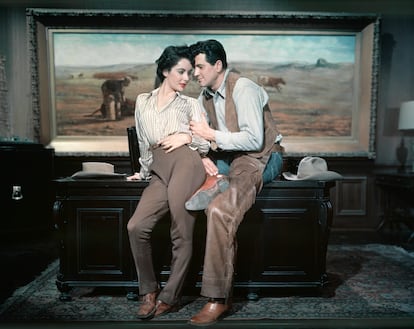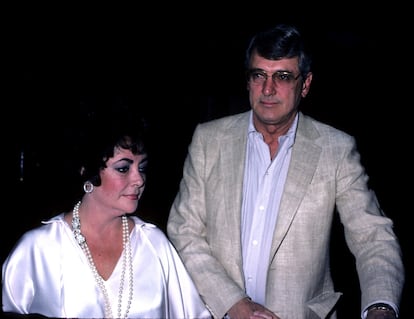Elizabeth Taylor secretly snuck into the hospital to visit Rock Hudson before he died
The actors became friends in 1956. After the heartthrob announced that he had AIDS, she wanted to say goodbye. She went on to create a foundation to fund the fight against the disease

In 1956, the star-studded film Giant became a hit. Its box office run made seven times its budget in revenue, and it was nominated for seven Oscars, winning Best Director. The movie went down in history as James Dean’s third and last work. The actor did not even see it released, as he died in September 1955, a year before its premiere.
Giant also brought together two historic acting talents: Elizabeth Taylor and Rock Hudson met on the film’s set in 1955, and they struck up a friendship that would last 30 years. At the time, Hudson had just married Phyllis Gates, his agent’s secretary, who he would divorce three years later. The marriage was an attempt to cover up Hudson’s homosexuality, which, despite being an open secret, was taboo in mid-century Hollywood.
Taylor and Hudson became inseparable. They traveled together and accompanied one other to events, dances and award ceremonies. And when the actor was about to die, his friend decided to sneak into the hospital to see him – a secret recently revealed by the actress’s good friend Michael Gottlieb, who was Hudson’s doctor.
“I picked Elizabeth up in my old station wagon, and we managed to get in through a loading dock at the back of the hospital to see him,” recalled Dr. Gottlieb in a recent interview published in Closer Weekly. Rock Hudson had been diagnosed with AIDS in Paris in early 1984. He lived there for more than a year trying different experimental therapies at the Pasteur Institute, and he was also admitted to the American Hospital in the French capital. In July 1985, already very ill, he decided to return to the United States. There, he spent time at the Hospital of the University of California, Los Angeles, where he revealed his illness. In October of that same year, he died in his Los Angeles home. He was 59 years old. The entertainment world mourned him.

At that time, AIDS was still almost unknown and deeply stigmatized. “Rock understood the implications of having AIDS in those early days,” Gottlieb said. “He was calm and hoped for the best.”
Hudson’s death brought a cascade of public interest in AIDS research. “[After his death], Elizabeth became a friend to me,” said the doctor. “Together, we started the American Foundation for AIDS research.” The Foundation is estimated to have donated more than $415 million (about €390 million) to the fight against the disease. “She had access to the White House and made a huge difference,” the doctor said.
One of Taylor’s biographers, Mark Griffin, has claimed that Rock Hudson’s death was one factor in Taylor’s activism, but not the only one. “Elizabeth had two gay assistants who died of AIDS early on in the crisis. Rock’s illness further cemented her determination to raise funds for research and treatment,” he said. Taylor devoted much of the 25 years after Rock Hudson’s death to the fight against AIDS, until her death in February 2011 at age 79.
Those efforts, along with the rest of her life story, will soon be recounted in Elizabeth The First, a 10-episode podcast narrated and co-produced by the singer Katy Perry, as announced in late March. Perry says that she has always felt a kind of kinship with Taylor, and she will recount the screen diva’s life of cinema, love, glamor, fame, public scrutiny and activism.
Tu suscripción se está usando en otro dispositivo
¿Quieres añadir otro usuario a tu suscripción?
Si continúas leyendo en este dispositivo, no se podrá leer en el otro.
FlechaTu suscripción se está usando en otro dispositivo y solo puedes acceder a EL PAÍS desde un dispositivo a la vez.
Si quieres compartir tu cuenta, cambia tu suscripción a la modalidad Premium, así podrás añadir otro usuario. Cada uno accederá con su propia cuenta de email, lo que os permitirá personalizar vuestra experiencia en EL PAÍS.
¿Tienes una suscripción de empresa? Accede aquí para contratar más cuentas.
En el caso de no saber quién está usando tu cuenta, te recomendamos cambiar tu contraseña aquí.
Si decides continuar compartiendo tu cuenta, este mensaje se mostrará en tu dispositivo y en el de la otra persona que está usando tu cuenta de forma indefinida, afectando a tu experiencia de lectura. Puedes consultar aquí los términos y condiciones de la suscripción digital.









































